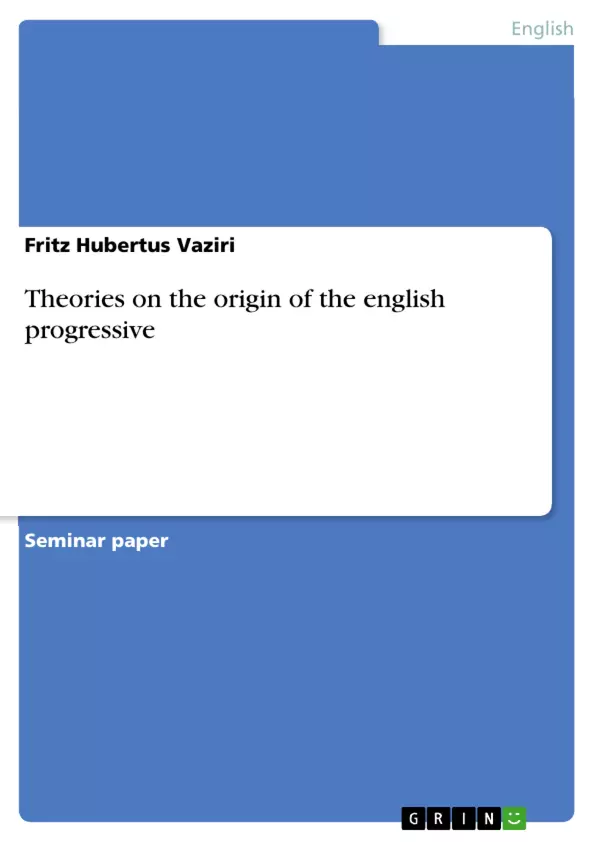The progressive form is a phenomenon frequently to be observed in Present Day English. But where does it actually come from? Has it always been part of English, or did it enter the language through another one? And if that is the case, which other language was involved?
Different theories offer different explanations on questions like the above. This paper attempts to give a brief illustration of the major ideas on the origin of the progressive as we know it today. A final conclusion will sum up central findings and try to articulate an opinion of its own based on the inspected data.
DENISON remarks that in Old English times constructions were used that consisted of two elements: a form of the verb beon/wesan and a present participle (V(i)ende). Such syntagms strongly resemble the progressive in its modern appearance.
There are several opinions circulating, as far as the question is concerned where the progressive comes from and how it turned out to be what it is now. Some scholars assume that the progressive developed as a result of a contact between English and the Celtic languages, others consider it more probable that an encounter with Latin was responsible, and finally, a third group believes no other language’s influence played a role in the development of the progressive, but that it evolved instead within Old English independently. Relevant aspects of these positions will be shortly outlined hereafter. ISAAC points out “that there has been an undeniable contact between English and the Celtic languages” but remains sceptical with regard to the issue of this contact’s significance for the development of linguistic features in English. MEID appears to be more confident in this matter, especially in connection with a possible Celtic influence on the English aspectual system.
And, indeed, several reasons suggest the possibility of a Celtic origin concerning the progressive form as it appears in Present Day English. The first is a very general one: Celtic has been among the languages that had some impact on the development of English at a certain point. Why shouldn’t it be possible, therefore, that it was responsible for the progressive as well?
Inhaltsverzeichnis (Table of Contents)
- Introduction
- Theories on the Origin of the Progressive
- Contact between Celtic and English
- Contact between Latin and English
- The "Independent Growth Hypothesis"
- The Phenomenon of Language Contact
- Conclusion
Zielsetzung und Themenschwerpunkte (Objectives and Key Themes)
This paper aims to provide an overview of the major theories regarding the origin of the English progressive. It examines the evidence for and against the influence of Celtic and Latin languages, as well as the possibility of independent development within Old English. The paper will also discuss the phenomenon of language contact in general.
- The origin of the English progressive
- The role of language contact in linguistic development
- The influence of Celtic languages on English
- The influence of Latin on English
- The independent development of the English progressive
Zusammenfassung der Kapitel (Chapter Summaries)
The first chapter introduces the topic of the English progressive and its historical development. It sets out the key questions addressed in the paper and provides a brief overview of the different theories on the origin of the progressive.
Chapter 2 delves into the different theories about the origin of the English progressive. It explores the argument that contact between Celtic and English languages led to the development of the progressive, as well as the possibility of Latin influence. Finally, it considers the "Independent Growth Hypothesis" which suggests that the progressive evolved independently within Old English.
Chapter 3 examines the phenomenon of language contact in general, providing a theoretical framework for understanding the potential impact of language contact on linguistic development.
Schlüsselwörter (Keywords)
The primary keywords of this paper include: English progressive, language contact, Celtic languages, Latin, Old English, linguistic development, grammatical change, historical linguistics, and comparative linguistics.
Frequently Asked Questions
What is the "progressive form" in English?
It is a verbal construction (e.g., "is walking") used to describe ongoing actions. It consists of a form of the verb "to be" and a present participle.
Did the progressive form originate from Celtic languages?
Some scholars argue that contact between English and Celtic led to the development of the progressive, as similar aspectual systems exist in Celtic languages.
Is there a Latin influence on the English progressive?
Another theory suggests that the construction was influenced by Latin models found in early translations and religious texts.
What is the "Independent Growth Hypothesis"?
This hypothesis posits that the progressive form evolved independently within Old English (beon/wesan + V-ende) without significant external influence from other languages.
How did Old English express continuous actions?
Old English used syntagms consisting of a form of "beon" or "wesan" combined with a present participle ending in "-ende", which resembles the modern "-ing" form.
- Citation du texte
- Fritz Hubertus Vaziri (Auteur), 2007, Theories on the origin of the english progressive, Munich, GRIN Verlag, https://www.grin.com/document/113296



